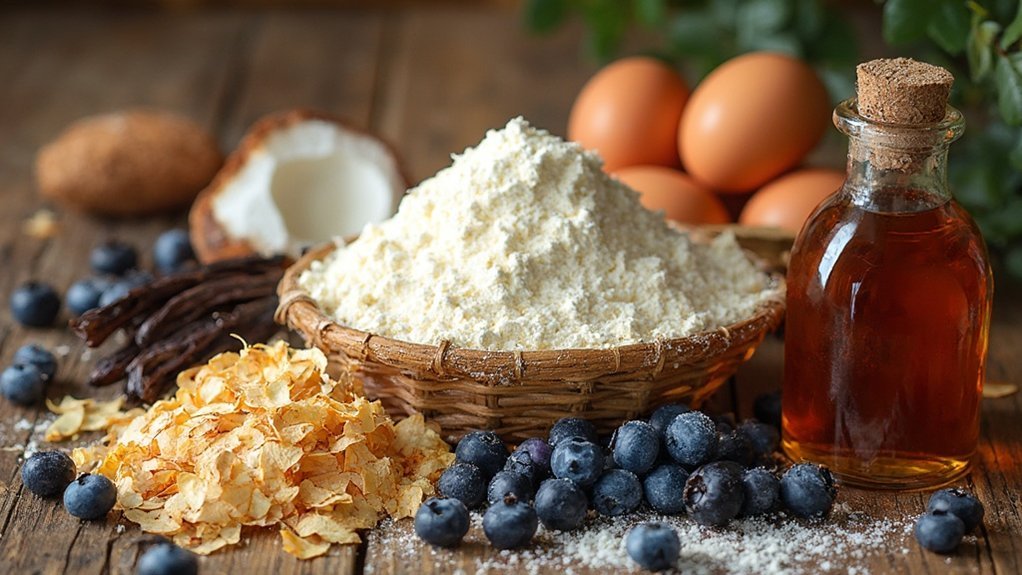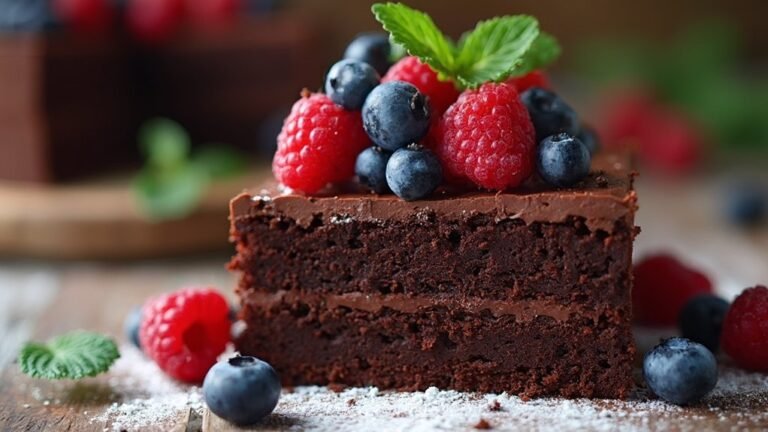Top 10 Organic Cake Ingredients You Should Know
To bake delicious organic cakes, it's essential to have a few key ingredients on hand. Start with organic plain flour for a lovely texture, and don't forget organic baking powder and bicarbonate of soda for that perfect rise. Organic unsalted butter adds richness, while organic cane sugar provides sweetness. Large organic eggs contribute moisture, and a dash of organic vanilla extract enhances the flavour. For a creamy finish, include organic cream cheese, and if you're looking for a gluten-free option, almond flour is a great choice. Keep an eye out for even more must-have ingredients!
Key Takeaways
- Organic Plain Flour offers a subtle nuttiness and is perfect for a range of baked treats, free from artificial additives.
- Organic Unsalted Butter adds richness and moisture to cakes, ensuring a lovely tender texture.
- Organic Cane Sugar provides a deep flavour and retains beneficial trace minerals, making it a healthier choice for sweetening.
- Organic Large Eggs are essential for moisture and structure, brimming with protein and vital nutrients.
- Organic Vanilla Extract elevates desserts with its aromatic flavour and comes in various strengths for versatile baking.
All-Purpose Organic Flour
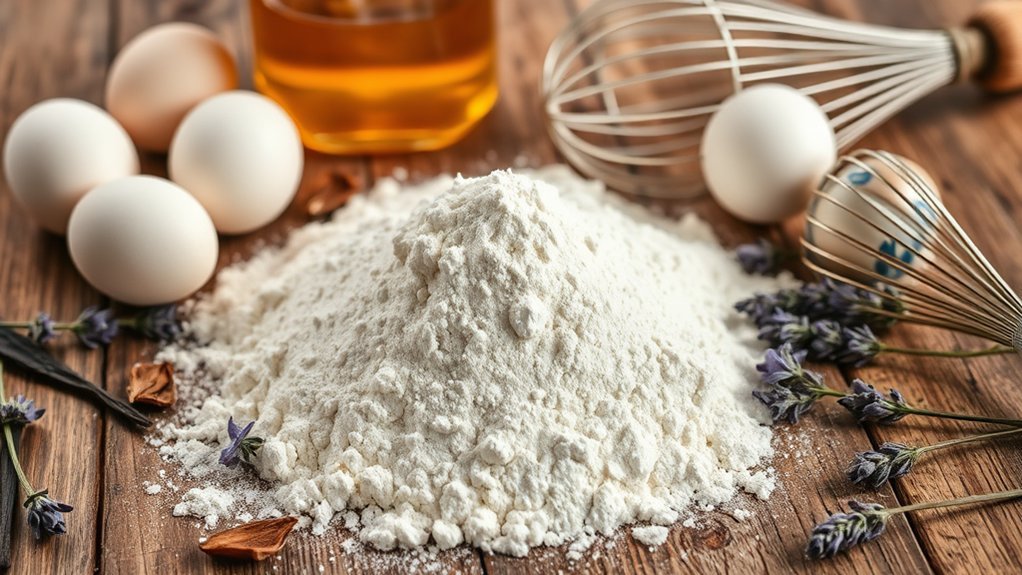
When you choose organic all-purpose flour, you're selecting a versatile ingredient that enhances your baking. Milled from pesticide-free grains, this flour retains the natural oils from the wheat germ, giving it a pleasant nutty flavour. It's ideal for various baking tasks, whether you're making cakes, cookies, or artisan bread. With no artificial additives, it's a healthier choice. Plus, it's unbleached, meaning no chemical exposure. This flour is produced from high-quality organic wheat, ensuring that you achieve the best results in your baked goods. For optimal results, store it in a cool, dry place and avoid over-mixing to keep your bakes light and fluffy.
Organic Baking Powder
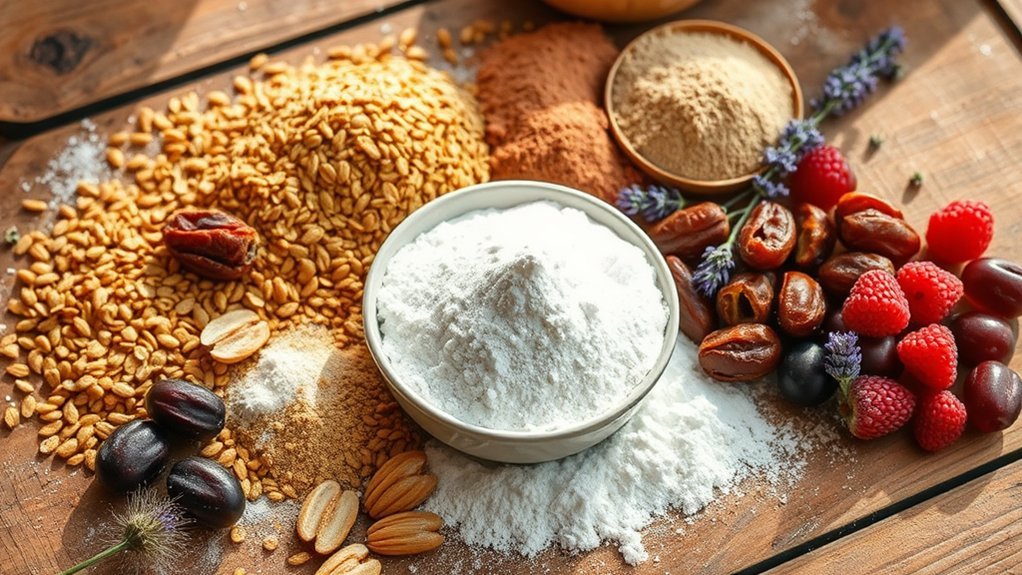
When baking a cake, achieving the right rise is crucial, and this is where organic baking powder excels. It offers a quick lift without the need for fermentation, and by opting for organic, you steer clear of synthetic additives. With various formulations available, you can easily find a baking powder that aligns with your health preferences while still ensuring excellent results. Organic baking powder typically contains sodium bicarbonate and acid, which work together to create the necessary leavening for your baked goods.
Importance in Cake Rise
Organic baking powder is crucial for ensuring your cakes rise beautifully and achieve that light, airy texture everyone loves.
It's a complete leavener, containing sodium bicarbonate and an acidic component like monopotassium tartrate. When mixed with liquid and heated, it releases carbon dioxide, creating bubbles that lift your batter. This leavening action is essential for sponge cakes, shortcakes, and even cookies, improving their texture without making them dense. Unlike baking soda, it doesn't need any additional acidic ingredients, making it a versatile option. Additionally, using pure cream of tartar in organic baking powder enhances the quality of your baked goods.
Be sure to store it properly to keep its effectiveness for perfect cake rises!
Organic vs. Conventional Options
Choosing the right baking powder can significantly affect your cake's texture and success. Organic baking powder is a great option; it's usually made from cream of tartar and baking soda, making it phosphate-free and potentially better for those concerned about phosphorus imbalance.
On the other hand, conventional baking powders often contain aluminium and additives like corn starch.
From a nutritional standpoint, organic baking powders are free from fats and sugars, meaning they contribute minimal calories. They're also typically gluten-free, making them suitable for gluten-sensitive bakers.
Many organic brands use recyclable packaging, appealing to eco-conscious consumers. So, when you're baking, opting for organic is a smart choice for both your health and the environment.
Organic Unsalted Butter

When you opt for organic unsalted butter in your baking, you're not just adding richness; you're also boosting moisture and flavour in your cakes.
Choosing quality butter can significantly impact the texture you achieve.
Additionally, knowing how to store and use it properly ensures you get the best results each time you bake.
Moisture and Flavor Benefits
When baking, organic unsalted butter significantly improves both moisture and flavour in your cakes. Its higher fat content keeps the cake tender and fresh, while its cleaner moisture profile reduces the chance of a soggy result. Using unsalted butter allows you to regulate salt levels, ensuring a consistent and delightful taste in every bite.
| Benefit | Organic Unsalted Butter | Butter Alternatives |
|---|---|---|
| Moisture Level | Higher fat content | Often contains water |
| Flavour Control | No added salt | Saltiness varies |
| Freshness | Fewer preservatives | May include additives |
| Texture | Creamy and smooth | Can be grainy |
| Quality | Pasture-raised milk | Quality varies |
Opting for organic unsalted butter ensures a delicious bake every time.
Choosing Quality Butter
Many bakers understand that choosing quality organic unsalted butter is crucial for making the perfect cake.
With a butterfat content of at least 80%, this ingredient provides a rich, creamy texture that enhances flavour and keeps your cake moist.
When selecting butter, look for those with organic certification and no artificial additives for a cleaner, healthier choice.
Consider the cows' diets, as they can affect the butter's colour and nutrients, with seasonal variations adding unique character.
Choose brands that prioritise ethical practices to align with your values.
Ultimately, quality butter can elevate your baking, making every bite a treat.
Storage and Usage Tips
To keep your organic unsalted butter fresh and flavourful, proper storage is key.
Store it in the fridge at temperatures between 2°C and 5°C, in its original wrapper or a covered dish to prevent it from absorbing other smells. Avoid leaving it at room temperature, as unsalted butter spoils more quickly than salted.
For longer-term storage, you can freeze it for up to a year without compromising its taste. Always check for any off smells or unusual colours as signs of spoilage.
When baking, soften the butter at room temperature for easier mixing, and use it promptly to preserve its flavour. If using frozen butter, cut it into smaller blocks for quicker thawing.
Organic Cane Sugar
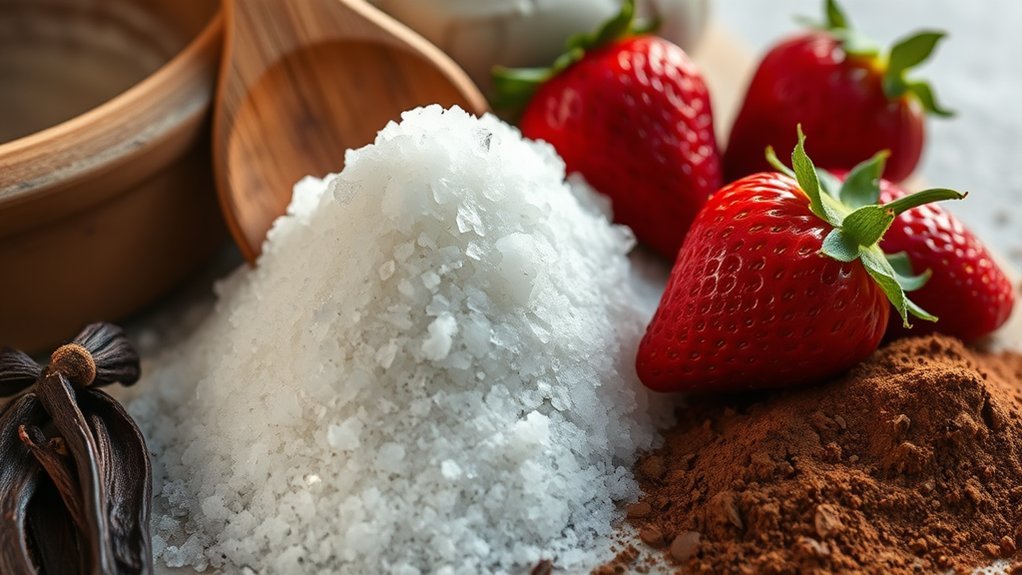
Organic cane sugar, sourced from sugar cane grown without synthetic pesticides or fertilisers, is a tasty alternative to refined sugars. Its light brown hue and rich flavour enhance baked goods wonderfully.
Plus, it offers health benefits that refined sugars simply don't.
- Retains trace minerals and vitamins
- Contains 17 amino acids and 11 minerals
- Minimally processed to maintain natural qualities
- No bleaching agents involved
- Eco-friendly production methods
Incorporate organic cane sugar into your cakes, biscuits, and drinks for a balanced sweetness that truly elevates flavours.
Organic Large Eggs
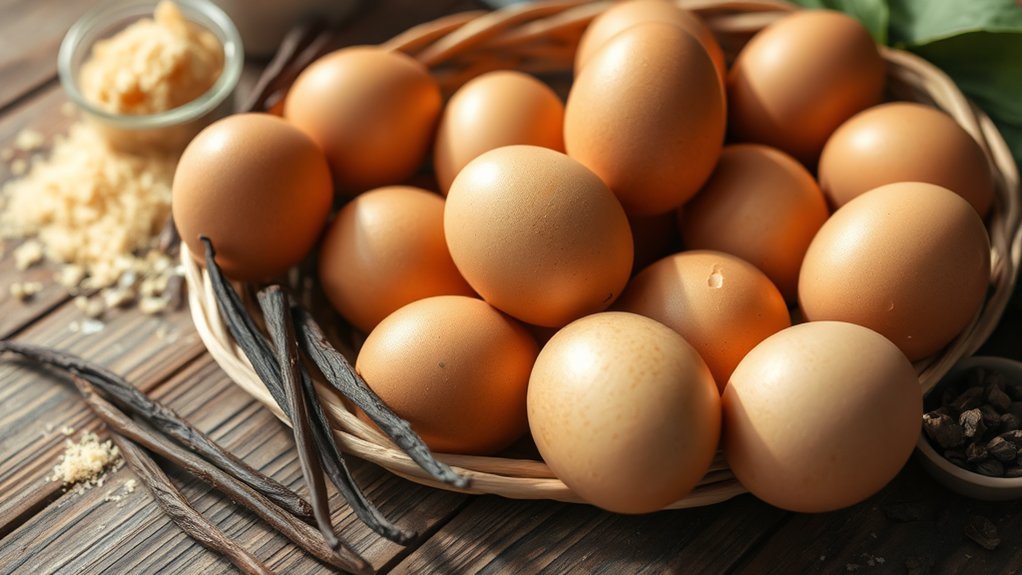
When you opt for organic large eggs in your baking, you're not only enhancing flavour but also boosting nutrition.
Each egg is packed with protein and healthy fats, resulting in moist, rich cakes.
Choosing organic means you're also supporting ethical farming practices that benefit both the hens and the environment.
Nutritional Benefits of Eggs
Eggs are a nutritional powerhouse, particularly organic large eggs, which offer a range of health benefits.
Here's what makes them a great addition to your diet:
- Around 70 calories and 6 grams of complete protein per egg
- Packed with healthy fats, including omega-3s, which support heart health
- Good source of essential nutrients, providing 22% of your daily selenium and 10% of your daily vitamin D
- Contains choline, beneficial for brain and liver function
- Rich in antioxidants like lutein and zeaxanthin, which promote eye health
Adding organic large eggs to your meals not only enhances flavour but also contributes to your overall health!
Role in Baking
In baking, large eggs are crucial for achieving great results. Their protein content provides structure and texture to cakes, while their moisture helps keep them soft and fresh.
When whisked, they act as a leavening agent, ensuring your bakes rise perfectly. The richness of organic large eggs also enhances flavour, making each bite more enjoyable.
For best results, use eggs at room temperature to create a smoother batter. Remember, the quality of eggs matters; high-quality organic eggs can subtly improve both flavour and texture.
Stick to large eggs for consistency, as their size ensures the right balance of liquid, contributing to your bake's lightness or density.
Sourcing Organic Options
Sourcing high-quality organic large eggs is essential for improving your baking.
Here are some great options to consider for their taste and ethical farming practices:
- Just FreshDirect: Organic brown eggs from the Alderfer family farm.
- Eggland's Best: USDA Organic certified eggs from cage-free hens.
- Smith Brothers Farms: Free-range eggs from Certified Humane farms.
- Pete & Gerry's: USDA Certified Organic eggs from free-range hens.
- Local Farmers' Markets: A reliable source for fresh, local organic eggs.
Choosing these options not only supports ethical farming but also enhances the flavour of your bakes.
Organic Whole Milk
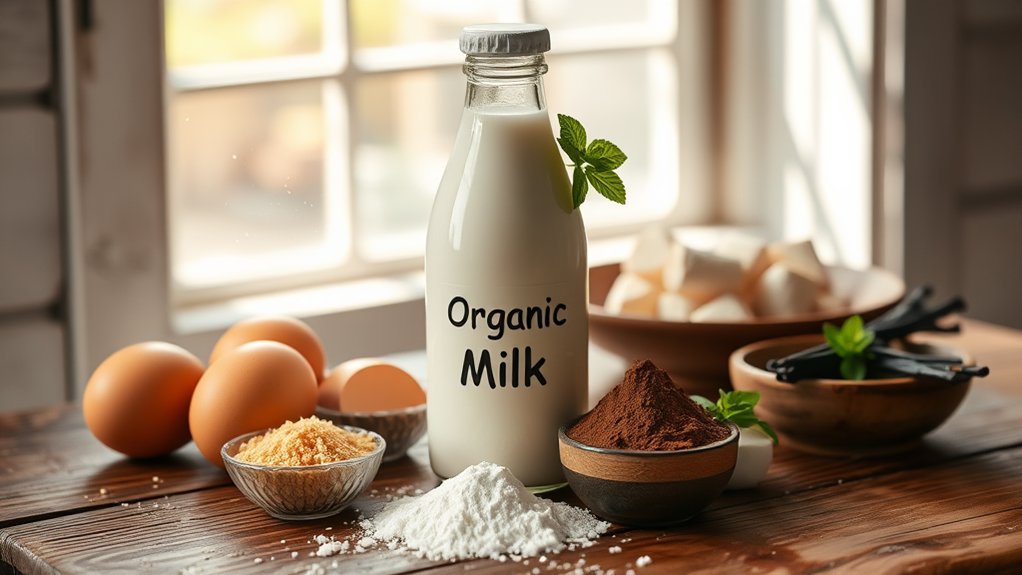
Organic whole milk is a creamy, nutritious choice for anyone looking for a wholesome dairy option. Sourced from cows that graze on natural grasses, this milk is packed with health benefits. Its production methods ensure it's free from hormones and antibiotics. Plus, it's rich in essential nutrients like calcium, vitamin D, and omega-3 fatty acids, all of which are important for heart health.
| Nutrient | Amount per Serving |
|---|---|
| Omega-3 Fatty Acids | 62% more |
| Vitamin D | Rich source |
| Calcium | High content |
Choosing organic whole milk means you're opting for a healthier dairy product that supports your well-being.
Organic Vanilla Extract
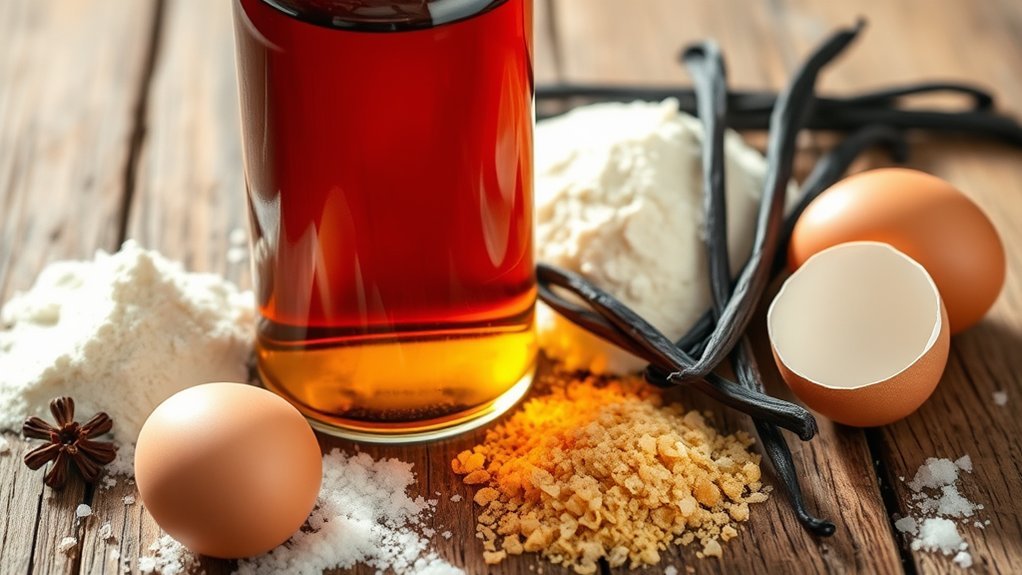
Organic vanilla extract is a kitchen essential that adds a rich, aromatic quality to your desserts. Made from organic vanilla beans, water, and organic ethyl alcohol, it offers a pure flavour experience.
Here are some of the main types:
- Madagascar Bourbon: Rich and creamy
- Tahitian: Fruity and floral
- Mexican: Spicy and bold
- Available in single-fold, double-fold, and triple-fold for different strengths
- High-quality beans sourced from regions like Madagascar and Tahiti
With a shelf life of up to five years, organic vanilla extract is versatile for various recipes, from cakes to custards.
Plus, its organic certification means no synthetic pesticides, making it a guilt-free choice for your baking needs.
Organic Cream Cheese
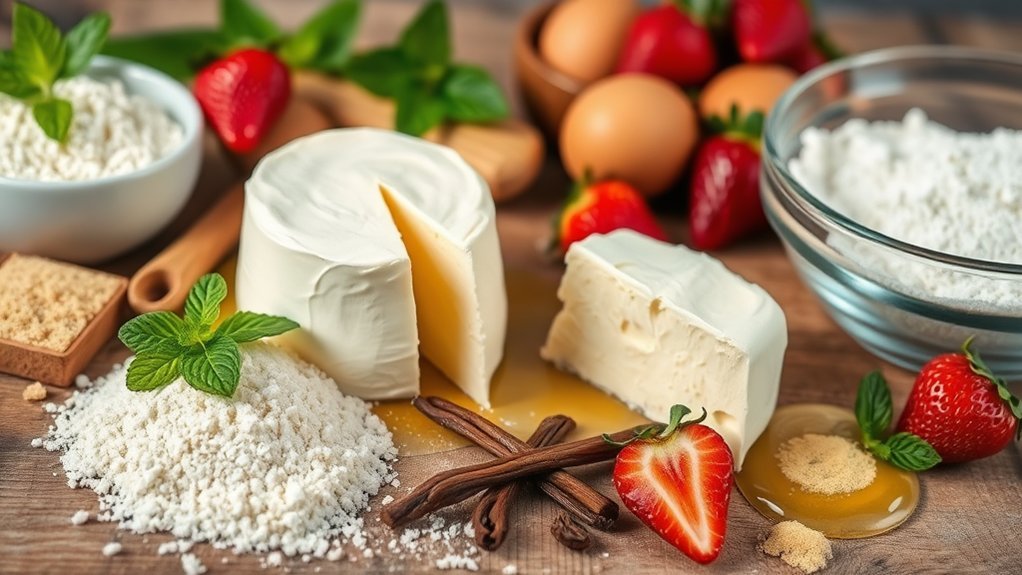
Organic cream cheese is a versatile ingredient that can enhance both sweet and savoury dishes with its creamy texture and tangy flavour. This delightful spread is ideal for recipes ranging from indulgent cheesecakes to tasty dips.
Made from organic pasteurised milk and cream, it typically avoids harmful pesticides and GMOs, offering both great taste and peace of mind. For those sensitive to dairy, lactose-free options are available, ensuring everyone can enjoy it.
With approximately 90 calories per serving and a moderate amount of protein and calcium, it fits well into a balanced diet. Whether you're spreading it on bagels or incorporating it into pasta sauces, organic cream cheese adds a rich, satisfying element to your meals.
Organic Baking Soda
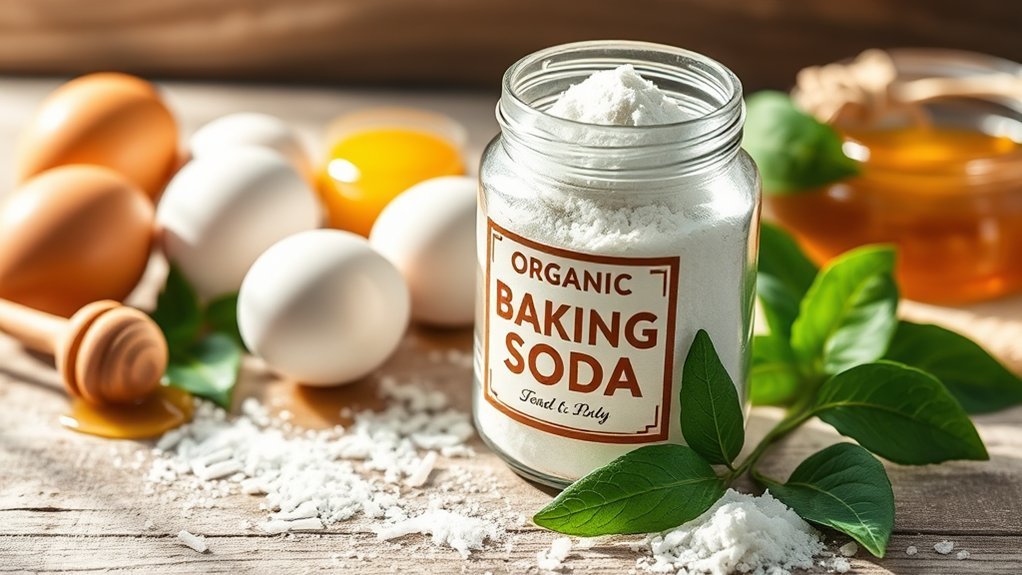
In baking, achieving the perfect rise often depends on using the right ingredients, and organic baking soda is key. This natural leavening agent, made from sodium bicarbonate, releases carbon dioxide when mixed with an acid or heated, which is vital for light cakes and quick breads.
Opting for organic ensures your baking soda is free from harmful additives.
- Promotes a lighter texture in baked goods
- Neutralises stomach acid for digestive comfort
- Acts as a natural deodorant in personal care
- Balances flavours in cooking
- Serves as a versatile household cleaner
Using organic baking soda not only enhances your baking but also supports a healthier lifestyle.
Almond Flour
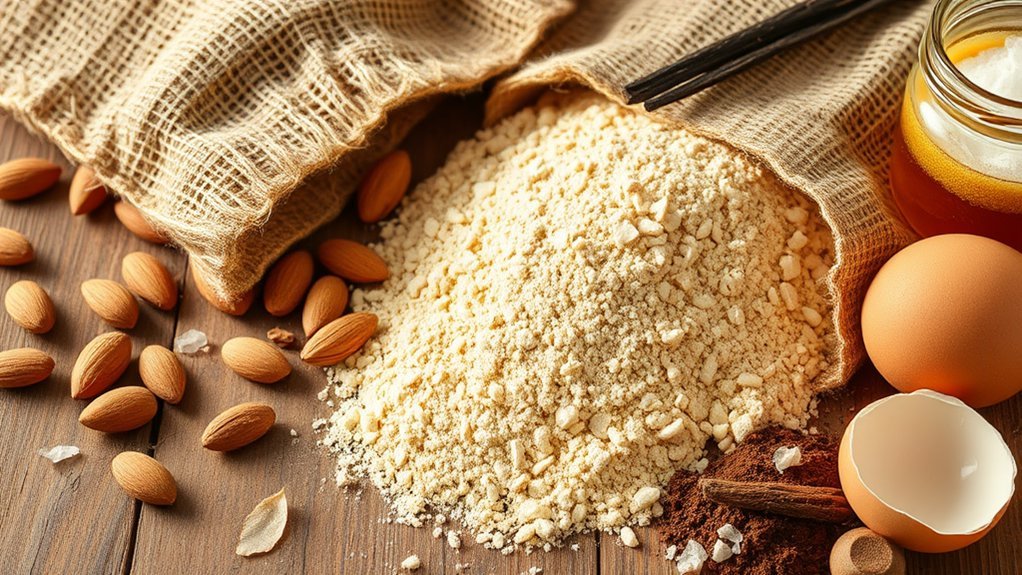
Almond flour is a versatile ingredient that can enhance your baking with its light, nutty flavour and impressive nutritional benefits.
This gluten-free option is rich in protein, healthy fats, and fibre, making it ideal for keto and paleo diets. You can create delicious almond flour recipes, such as cakes, cookies, and muffins, without causing a spike in blood sugar due to its low glycemic index.
Its fine texture helps retain moisture and improve the structure of your baked goods, especially when used with egg whites.
Choosing organic almond flour ensures minimal processing, giving you a nutritious boost in every bite.
Stock up on almond flour and elevate your baking today!
Frequently Asked Questions
Can I Substitute Almond Flour for All-Purpose Flour in Cakes?
Yes, you can substitute almond flour for plain flour in cakes. This change improves the cake's texture, adding moisture and a subtle nutty flavour. Just adjust the quantities and consider adding an extra egg for the best results.
How Do I Store Organic Cakes for Freshness?
To keep your organic cakes fresh, store them in airtight containers. If your cake contains perishable ingredients, it's best to refrigerate it; for other cakes, room temperature is fine. Always keep it away from direct sunlight to maintain its flavour and texture.
Are Organic Ingredients Worth the Extra Cost?
When thinking about organic ingredients, consider whether the extra cost is justified by potential health benefits. For instance, by spending a bit more, you can have confidence that you're steering clear of harmful pesticides and backing sustainable farming methods. It's about making a choice that aligns with your values and health priorities.
What Are the Benefits of Using Organic Butter?
Using organic butter in your baking offers several advantages. You'll experience a richer flavour, better nutritional value, and healthier fats. Its creamy texture elevates your dishes, ensuring every bite is satisfying and deliciously wholesome. For example, using organic butter in a cake can enhance its moisture and taste, making it a standout treat.
Can I Make a Vegan Cake With These Ingredients?
Yes, you can certainly make a vegan cake with these ingredients! By using flaxseed as an egg substitute, you'll create a lovely, moist cake that's perfect for any occasion.
Conclusion
As you venture into organic baking, remember that each ingredient is crucial for your delicious creations. Choosing organic is more than just a fad; it's a pledge to quality and flavour. Picture the soft, velvety texture of a cake made with organic flour and the authentic taste of real vanilla. By selecting these top ingredients, you're not just baking—you're nourishing yourself and treating your taste buds with every bite. So, what are you waiting for? Get baking!

